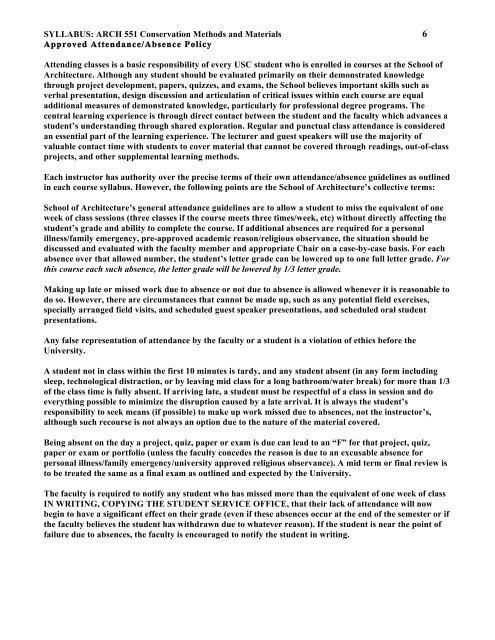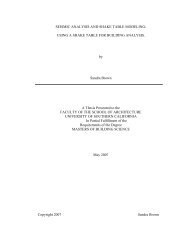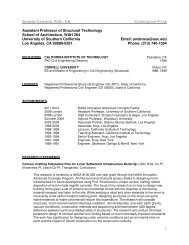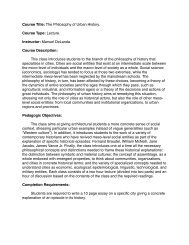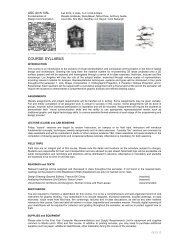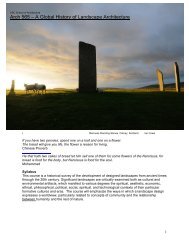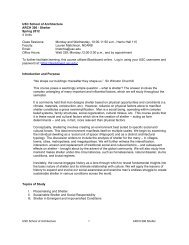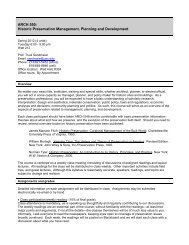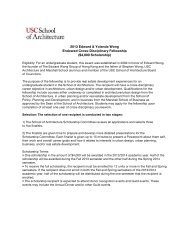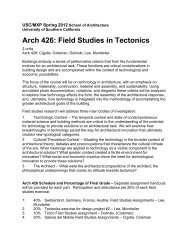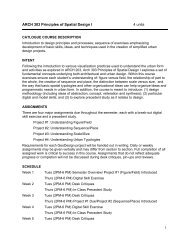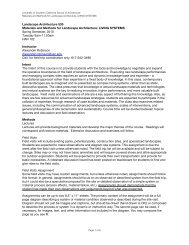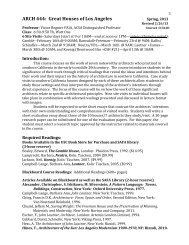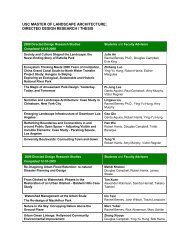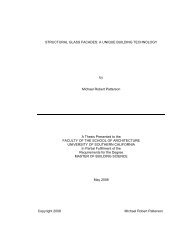ARCH 551 Syllabus.pdf - USC School of Architecture
ARCH 551 Syllabus.pdf - USC School of Architecture
ARCH 551 Syllabus.pdf - USC School of Architecture
Create successful ePaper yourself
Turn your PDF publications into a flip-book with our unique Google optimized e-Paper software.
SYLLABUS: <strong>ARCH</strong> <strong>551</strong> Conservation Methods and Materials 6<br />
Approved Attendance/Absence Policy<br />
Attending classes is a basic responsibility <strong>of</strong> every <strong>USC</strong> student who is enrolled in courses at the <strong>School</strong> <strong>of</strong><br />
<strong>Architecture</strong>. Although any student should be evaluated primarily on their demonstrated knowledge<br />
through project development, papers, quizzes, and exams, the <strong>School</strong> believes important skills such as<br />
verbal presentation, design discussion and articulation <strong>of</strong> critical issues within each course are equal<br />
additional measures <strong>of</strong> demonstrated knowledge, particularly for pr<strong>of</strong>essional degree programs. The<br />
central learning experience is through direct contact between the student and the faculty which advances a<br />
student’s understanding through shared exploration. Regular and punctual class attendance is considered<br />
an essential part <strong>of</strong> the learning experience. The lecturer and guest speakers will use the majority <strong>of</strong><br />
valuable contact time with students to cover material that cannot be covered through readings, out-<strong>of</strong>-class<br />
projects, and other supplemental learning methods.<br />
Each instructor has authority over the precise terms <strong>of</strong> their own attendance/absence guidelines as outlined<br />
in each course syllabus. However, the following points are the <strong>School</strong> <strong>of</strong> <strong>Architecture</strong>’s collective terms:<br />
<strong>School</strong> <strong>of</strong> <strong>Architecture</strong>’s general attendance guidelines are to allow a student to miss the equivalent <strong>of</strong> one<br />
week <strong>of</strong> class sessions (three classes if the course meets three times/week, etc) without directly affecting the<br />
student’s grade and ability to complete the course. If additional absences are required for a personal<br />
illness/family emergency, pre-approved academic reason/religious observance, the situation should be<br />
discussed and evaluated with the faculty member and appropriate Chair on a case-by-case basis. For each<br />
absence over that allowed number, the student’s letter grade can be lowered up to one full letter grade. For<br />
this course each such absence, the letter grade will be lowered by 1/3 letter grade.<br />
Making up late or missed work due to absence or not due to absence is allowed whenever it is reasonable to<br />
do so. However, there are circumstances that cannot be made up, such as any potential field exercises,<br />
specially arranged field visits, and scheduled guest speaker presentations, and scheduled oral student<br />
presentations.<br />
Any false representation <strong>of</strong> attendance by the faculty or a student is a violation <strong>of</strong> ethics before the<br />
University.<br />
A student not in class within the first 10 minutes is tardy, and any student absent (in any form including<br />
sleep, technological distraction, or by leaving mid class for a long bathroom/water break) for more than 1/3<br />
<strong>of</strong> the class time is fully absent. If arriving late, a student must be respectful <strong>of</strong> a class in session and do<br />
everything possible to minimize the disruption caused by a late arrival. It is always the student’s<br />
responsibility to seek means (if possible) to make up work missed due to absences, not the instructor’s,<br />
although such recourse is not always an option due to the nature <strong>of</strong> the material covered.<br />
Being absent on the day a project, quiz, paper or exam is due can lead to an “F” for that project, quiz,<br />
paper or exam or portfolio (unless the faculty concedes the reason is due to an excusable absence for<br />
personal illness/family emergency/university approved religious observance). A mid term or final review is<br />
to be treated the same as a final exam as outlined and expected by the University.<br />
The faculty is required to notify any student who has missed more than the equivalent <strong>of</strong> one week <strong>of</strong> class<br />
IN WRITING, COPYING THE STUDENT SERVICE OFFICE, that their lack <strong>of</strong> attendance will now<br />
begin to have a significant effect on their grade (even if these absences occur at the end <strong>of</strong> the semester or if<br />
the faculty believes the student has withdrawn due to whatever reason). If the student is near the point <strong>of</strong><br />
failure due to absences, the faculty is encouraged to notify the student in writing.


